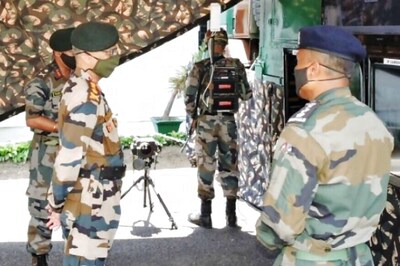
views
Rajya Sabha elections will be held on Friday (June 10) for 16 seats in four states – Maharashtra, Rajasthan, Karnataka, and Haryana. The results will be declared on the same day.
Chief Election Commissioner Rajiv Kumar on Thursday said special observers have been appointed to oversee the poll process which will be video graphed. This comes amid allegations of attempts at horse-trading in the Rajya Sabha elections in four states.
Seeking to keep their flock together, major political parties have corralled their MLAs in hotels and resorts, amid accusations of attempts at poaching.
The date for withdrawal of candidature was June 3, while the last day of filing nominations was May 31. The voting is being conducted to fill up 57 Rajya Sabha seats falling vacant due to the retirement of members between June and August.
This year, the Rajya Sabha elections assume importance as they will be held just a month ahead of the presidential elections, which is scheduled to take place on July 18.
Here’s all you need to know about the process of electing members of Rajya Sabha:
What is the Rajya Sabha?
India follows the British parliamentary system, so the Rajya Sabha, or the Upper House of Parliament, is equivalent to the House of Lords in the United Kingdom. It is a permanent body that is never dissolved and can have a maximum of 250 members, as per the Constitution.
As of 2021, it has a sanctioned strength of 245, of which 233 are elected from states and union territories. The remaining 12 are nominated by the president, chosen for their contributions to the fields of art, literature, science and social services.
The Indian vice-president is chairperson of the Upper House, while it also has a deputy chair. Right now, vice-president M Venkaiah Naidu is the Rajya Sabha chairman.
How are members elected?
Members of the Rajya Sabha are elected through single transferable vote through open ballot. They are indirectly elected by party MLAs unlike the Lok Sabha members, who are elected by the public.
One-third members retire every second year and are replaced by newly chosen members. Each member serves for a term of six years. In case of death, disqualification or resignation, bypolls are held.
Like the Lok Sabha, each state is allocated Rajya Sabha candidates based on population. As and when a new state is created or a merger takes place, the Rajya Sabha make-up also changes accordingly.
How does voting work?
Seeing as MLAs choose members, it is a logical conclusion that political parties with a higher strength of MLAs will send more MPs to the Rajya Sabha. But that’s not always the case.
Voting takes place through the proportional representation system using single transferable voting, where each MLA’s vote is counted only once. But they don’t vote for every single seat. Under this process, members have to list 10 candidates in the order of preference.
Candidates are elected when 10 or more members list them as their first choice. As and when candidates are elected, “surplus” votes are transferred to the next candidates. This allows MLAs to vote for candidates from other parties.
The ballot is open but MLAs have to show their ballots to an authorised agent from their party to prevent practices such as cross-voting. A vote cannot be counted if the ballot is not shown to the agent. Independents cannot show their ballot to anyone.
Voting now for 16 seats in four states
Of the 57 vacancies in Rajya Sabha, 41 candidates in 11 states have so far been elected unopposed. The elections will be held for six seats in Maharashtra, four each in Rajasthan and Karnataka and two in Haryana, on June 10.
41 members elected unopposed on June 5
At least 41 winners were declared elected unopposed on June 5. P Chidambaram and Rajeev Shukla of the Congress, BJP’s Sumitra Valmiki and Kavita Patidar, former Congress leader Kapil Sibal, RJD’s Misa Bharti and Jayant Chaudhary of the RLD were among those who were elected unopposed.
Of the 11 candidates declared elected in Uttar Pradesh, eight are from BJP, one each from Samajwadi Party and RLD, along with independent Sibal. The winners from the state are Jayant Chaudhary (RLD), Javed Ali Khan (SP), Darshana Singh, Babu Ram Nishad, Mithilesh Kumar, Radha Mohan Dal Agarwal, K Laxman, Laxmikant Bajpai, Surendra Singh Nagar, Sangeeta Yadav (all BJP).
The winners from Tamil Nadu are the ruling DMK’s S Kalyanasundaram, R Girirajan and KRN Rajesh Kumar, AIADMK’s C Ve Shanmugam and R Dharmar and Congress’s Chidambaram.
All five candidates from Bihar were elected unopposed – Misa Bharti and Faiyaz Ahmed (RJD), Satish Chandra Dubey and Shambhu Sharan Patel (BJP), and Kheeru Mahto (JDU).
V Vijayasai Reddy, Beeda Masthan Rao, R Krishnaiah and S Niranjan Reddy of the ruling YSR Congress were also elected unopposed from Andhra Pradesh.
Candidates of the AAP – noted environmentalist Balbir Singh Seechewal and entrepreneur-social activist Vikramjit Singh Sahney – were declared winners in Punjab. In March, the AAP had nominated former cricketer Harbhajan Singh, AAP leader Raghav Chadha, Lovely Professional University founder Ashok Mittal, former IIT Delhi faculty Sandeep Pathak and industrialist Sanjeev Arora for Rajya Sabha. They all were elected unopposed from Punjab.
In Chhattisgarh, both nominees of the ruling Congress – Shukla and Ranjeet Ranjan – were elected unopposed. The Opposition BJP did not field its candidate in view of its low strength in the state assembly.
JMM’s Mahua Maji and BJP’s Aditya Sahu were elected unopposed from Jharkhand. BJP candidate from Uttarakhand, Kalpana Saini, was also elected unopposed. The BJD won all the three seats in Odisha and the TRS both the seats in Telangana.
Who are the prominent candidates?
The Congress is seeking to ensure that its candidates win RS elections in Haryana, Rajasthan and Maharashtra, while the BJP has put its weight behind independent candidates in Haryana and Rajasthan.
AICC general secretary Ajay Maken is the Congress candidate from Haryana, where two seats have fallen vacant. The Congress and the BJP are likely to get one seat each, but the BJP has backed media baron Kartikeya Sharma as an independent. Kartikeya is the son of Venod Sharma and son-in-law of former Haryana speaker Kuldeep Sharma.
The Congress needs 31 votes to win the seat and has as many MLAs. The BJP is banking on cross-voting. For the four Rajya Sabha seats in Rajasthan, the Congress has fielded three candidates – Randeep Surjewala, Mukul Wasnik and Pramod Tiwari. While the Congress is sure to get two seats, it needs 15 more votes to win the third seat of Tiwari. The BJP has fielded its former minister Ghanshyam Tiwari, and backed media baron Subhash Chandra as an independent for the second seat.
In Maharashtra, the Shiv Sena and the BJP will battle it out for the sixth seat of Rajya Sabha as none of the seven candidates in the fray – four of the ruling MVA and three of BJP – withdrew their nominations. The Congress has also fielded another candidate Mansoor Ali Khan in Karnataka. Jairam Ramesh is the other Congress candidate.
(with PTI inputs)
Read all the Latest Politics News here




















Comments
0 comment